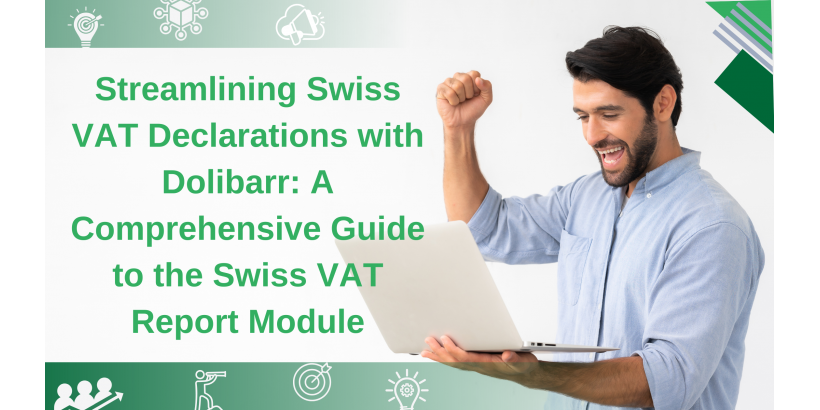
In the complex landscape of Swiss taxation, businesses are often challenged by the intricacies of Value Added Tax (VAT) compliance. Accurate and timely VAT reporting is not just a legal obligation but a critical component of financial management. For organizations utilizing Dolibarr ERP/CRM, the Swiss VAT Report Module emerges as a pivotal tool, simplifying the process of generating VAT declarations in alignment with Swiss regulations.
This article delves into the functionalities, benefits, and integration capabilities of the Swiss VAT Report Module within Dolibarr, offering a detailed roadmap for businesses aiming to enhance their VAT reporting efficiency.
Understanding the Swiss VAT Landscape
Switzerland's VAT system is characterized by its unique rates and reporting requirements. The standard VAT rate stands at 7.7%, with reduced rates of 2.5% for essential goods and services, and a special rate of 3.7% applicable to the hospitality sector. Businesses are mandated to submit periodic VAT returns, detailing taxable transactions, input tax deductions, and the net VAT payable or refundable.
The complexity of these requirements necessitates a robust system that can handle the nuances of Swiss VAT, ensuring compliance and minimizing the risk of errors.
Introducing the Swiss VAT Report Module for Dolibarr
The Swiss VAT Report Module is a specialized extension designed to integrate seamlessly with Dolibarr ERP/CRM. Its primary function is to automate the generation of VAT declarations based on payroll data, ensuring that all calculations adhere to Swiss tax laws.
Key features of the module include:
-
Automated VAT Calculation: The module computes VAT amounts based on payroll entries, considering applicable rates and deductions.
-
Compliance with Swiss Regulations: It aligns with the Swiss Federal Tax Administration's (FTA) guidelines, ensuring that all reports meet legal standards.
-
Integration with Payroll Module: The module works in tandem with the Swiss Payroll Module in Dolibarr, facilitating a cohesive data flow between payroll processing and VAT reporting.
-
User-Friendly Interface: Designed with usability in mind, the module offers an intuitive interface for generating and reviewing VAT reports.
Integration with Dolibarr's Swiss Payroll Module
The synergy between the Swiss VAT Report Module and Dolibarr's Swiss Payroll Module is central to its functionality. The payroll module captures detailed salary information, including gross wages, deductions, and employer contributions. This data serves as the foundation for VAT calculations.
By leveraging the payroll data:
-
Accurate VAT Reporting: The module ensures that VAT declarations reflect actual payroll expenses, enhancing accuracy.
-
Efficiency: Automating the data transfer between payroll and VAT reporting reduces manual entry, saving time and minimizing errors.
-
Consistency: Maintaining a unified data set across modules promotes consistency in financial reporting.
Benefits of Utilizing the Swiss VAT Report Module
Implementing the Swiss VAT Report Module within Dolibarr offers several advantages:
-
Regulatory Compliance: Ensures that VAT declarations conform to Swiss tax laws, reducing the risk of penalties.
-
Time Savings: Automates complex calculations and report generation, freeing up resources for other critical tasks.
-
Error Reduction: Minimizes manual data entry, decreasing the likelihood of mistakes in VAT reporting.
-
Enhanced Financial Oversight: Provides clear insights into VAT liabilities, aiding in financial planning and decision-making.
Implementation and Configuration
Setting up the Swiss VAT Report Module involves a straightforward process:
-
Installation: Download and install the module from the Dolibarr marketplace.
-
Configuration: Define VAT rates, reporting periods, and link the module to the payroll system.
-
Data Mapping: Ensure that payroll data fields correspond correctly with VAT reporting requirements.
-
Testing: Run preliminary reports to verify accuracy before official submission.
-
Training: Educate relevant staff on using the module to maximize its benefits.
Best Practices for Effective Use
To fully leverage the module's capabilities:
-
Regular Updates: Keep the module and Dolibarr system updated to incorporate the latest tax law changes.
-
Data Accuracy: Maintain accurate and up-to-date payroll records to ensure reliable VAT reports.
-
Periodic Reviews: Regularly review VAT reports for discrepancies and address any issues promptly.
-
Professional Consultation: Engage with tax professionals to validate the accuracy of VAT declarations and stay informed about regulatory changes.
Conclusion
The Swiss VAT Report Module for Dolibarr stands as a vital tool for businesses operating within Switzerland's complex tax environment. By automating VAT calculations and integrating seamlessly with payroll data, it not only ensures compliance but also enhances operational efficiency. For organizations seeking to streamline their VAT reporting processes, this module offers a comprehensive solution, aligning financial management practices with Swiss tax regulations.
